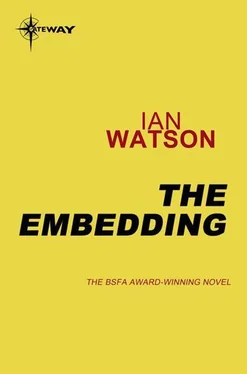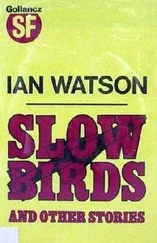Ian Watson - The Embedding
Здесь есть возможность читать онлайн «Ian Watson - The Embedding» весь текст электронной книги совершенно бесплатно (целиком полную версию без сокращений). В некоторых случаях можно слушать аудио, скачать через торрент в формате fb2 и присутствует краткое содержание. Жанр: Фантастика и фэнтези, на английском языке. Описание произведения, (предисловие) а так же отзывы посетителей доступны на портале библиотеки ЛибКат.
- Название:The Embedding
- Автор:
- Жанр:
- Год:неизвестен
- ISBN:нет данных
- Рейтинг книги:4 / 5. Голосов: 1
-
Избранное:Добавить в избранное
- Отзывы:
-
Ваша оценка:
- 80
- 1
- 2
- 3
- 4
- 5
The Embedding: краткое содержание, описание и аннотация
Предлагаем к чтению аннотацию, описание, краткое содержание или предисловие (зависит от того, что написал сам автор книги «The Embedding»). Если вы не нашли необходимую информацию о книге — напишите в комментариях, мы постараемся отыскать её.
The Embedding — читать онлайн бесплатно полную книгу (весь текст) целиком
Ниже представлен текст книги, разбитый по страницам. Система сохранения места последней прочитанной страницы, позволяет с удобством читать онлайн бесплатно книгу «The Embedding», без необходимости каждый раз заново искать на чём Вы остановились. Поставьте закладку, и сможете в любой момент перейти на страницу, на которой закончили чтение.
Интервал:
Закладка:
In this three-dimensional flatland of ours, words flow forward and only hang fire of their meaning so pitiably short a time, while memories flow hindwards with such a pitiably feeble capacity to hold themselves in full present awareness. Our illusion of the present is like a single dot on a graph we can never get to see the whole of. It is a pingpong ball dancing on a jet of water, unaware of the jet. The jagged inkdrip of a thought recorded by the electroencephalograph pen.
Last night he had understood Roussel’s poem easily, effortlessly, and entirely. He held its embeddings in the forefront of his head. Held and held and continued to hold, while subprogramme after subprogramme started in, deferred to the next subprogramme, and sub-deferred again—and everything fitted together. Visual images of the embedded poem flowed within one another, all held together in a wheeling zodiac that spun round the deepest self-embedded axis in his mind.
Yet there had been terrible danger. He still sweated at the thought of it.
He had tamed the poem—and therefore the experience—only because he knew it so well already in its separate parts. Just as the Xemahoa already knew the separate elements of their coded myths, from childhood.
Throughout the Xemahoa chant-song, that many-part fugue of the Xemahoa B language, he felt his mind was splitting, flying apart, fluttering to pieces. He had feared the birds were all flying out of his head and near to losing their way in endless jungle.
It was Kayapi who netted his birds and herded them together. Kayapi saw what was happening to him and dragged him by the hand to the tape recorder, switched the poem on.
Kayapi knew the track of his lost flock of words.
Now—with the same competence—he piloted Pierre through the drowning jungle where ants fled like refugees, and wild pigs splashed and grunted, where butterflies made clouds of colour, and pium flies descended in searing fogs, while the snouts of caymans nuzzled the waves of their wake.
All these creatures were the tools of Xemahoa thinking. Today, the jungle seemed to be one vast beating brain.
Destroy these tools, and you would destroy the Xemahoa. For then they could not think anymore. They would become Caraiba, foreigners, to themselves.
Through the afternoon the fugue of thoughts faded in Pierre’s head, as he stared at the wet trees. By nightfall, the rainclouds had moved away from moon and stars. The dugout continued on its way through broader and broader channels by moonlight. It passed over flooded acres, through lagoons bristling with drowning vegetation. Pierre knew he would have got the outboard propeller tangled before many miles were up. But Kayapi piloted them through effortlessly and untiringly, sensing the right channels with a dexterity that shamed the Frenchman. Yet, for Kayapi, wasn’t it his own drowning mind that he was navigating?
Finally, hours after nightfall, the Indian did get tired. Abruptly he beached the dugout on an isle of rotten logs, stretched himself out and slept.
Pierre also fell asleep eventually; yet slept more fitfully, haunted by dying images of the embedding dance. In his dream birdfeathers formed into a giant roulette wheel. He rolled round this, his body bunched up into a ball, until the circle of numbered feathers flew apart, took wing in all directions, and lost themselves in the greater wheel of the zodiac of stars—shocked out of interstellar darkness into sunlight only by the dawn booming of a band of howler monkeys migrating through trees across the lagoon.
Kayapi immediately sat up, grinned, and set the boat on course again before producing some more dry piraracu and some pulp cakes.
“Kayapi—”
“Pee-áir?”
“When we get there—”
“Yes, Pee-áir?”
“When we reach the dam—”
But what? What! He didn’t know!
“Kayapi, how soon is maka-i to be born?”
“When we get back.”
“Tell me what tree maka-i lives with in the jungle?”
“The tree called xe-wo-i.”
“What’s that in Portuguese?”
“The Caraiba have no word.”
“Can you point one out to me?”
“Here? No. I said, Pee-áir, there are kai-kai places only.”
He flourished the fingers of one hand.
“Can’t you describe the tree?”
He shrugged.
“It’s small. Has a rough skin like the cayman. You remember eating some soil? The tree was just beside there.”
“What? But I didn’t see any fungus there.”
“Maka-i was asleep. When the waters come and go, he wakes.”
“Oh, I see—the fungus only grows after the ground’s been covered with water. Is that right?”
Kayapi nodded.
Why hadn’t he thought of taking a sample of the soil that day to run a chemical analysis on, instead of just eating it! Why hadn’t Kayapi told him then that that’s where maka-i grew! Instead of just asking him to eat some earth without explaining. But of course the Indian couldn’t have conceived of taking a soil sample to a laboratory. His body was his own laboratory.
Now that Pierre saw the soil-eating incident in perspective, it all seemed like part of a carefully scripted initiation course. Maybe eating the soil had been some sort of necessary biochemical preparation, before the fungus drug could act on him?
The intricacy of the links that held the mental and social life of these people together! Links between tree and soil and fungus; shit and sperm and laughter. Between floodwater and language, myth and incest. Where was the boundary between reality and myth? Between ecology and metaphor? Which elements could safely be left out of the picture? The eating of a handful of soil? The spilling of sperm on the soil? The counting by significant feathers (in whatever way these were ‘significant’)? The tree that the maka-i grew on?
The scientific answer was to take soil samples and specimens of the fungus, and blood samples from the Xemahoa. To analyse, to synthesize, ultimately to market the results in a neat round pill. Twenty-five milligrams of ‘X’. What would they call the drug? ‘Embedol’ or some such name! First the scientific journals, then the dope market.
Undoubtedly some measurable biochemical change took place within the brain—in its ability to process information, to hold vastly greater amounts before the attention than usual. Might it not even be possible that maka-i actually did convey power over Nature—power to intervene and change the world? For what was nature, what was the whole physical world, except information chemically and physically coded—and he who held access to the information symbols in their totality held direct access to reality, held the magician’s legendary powers in his grasp. Even this did not seem totally impossible to Pierre, in the aftermath of his experience—though Logic and Reason fought against this fantastic dream.
At the very least the Xemahoa had a marketable ‘high’ to set beside mescaline and psilocybin and LSD. Their high was more specific in its function than those other psychedelic drugs. Still, it could be made into another commodity for purchase by the freaked-out pissed-off playboys of the Western World!
Twenty-five milligrams of maka-i. Of embedol. With all its messy appurtenances lopped off. The eating of soil. The rotting of the nostrils. It would be one hell of a commodity.
Yet for the Indians it was that very complex of physical and metaphorical events—the soil and sperm and shit and bloody nostrils—that made up life and meaning and existence.
In the tin refugee camp beyond the orange fly-paper set up to trap them they would be shadows, not substances. Shadows whispering bastard Caraiba words as they faded. The birds would have flown out of their heads over a featurless waste of water with no way home…
Читать дальшеИнтервал:
Закладка:
Похожие книги на «The Embedding»
Представляем Вашему вниманию похожие книги на «The Embedding» списком для выбора. Мы отобрали схожую по названию и смыслу литературу в надежде предоставить читателям больше вариантов отыскать новые, интересные, ещё непрочитанные произведения.
Обсуждение, отзывы о книге «The Embedding» и просто собственные мнения читателей. Оставьте ваши комментарии, напишите, что Вы думаете о произведении, его смысле или главных героях. Укажите что конкретно понравилось, а что нет, и почему Вы так считаете.












